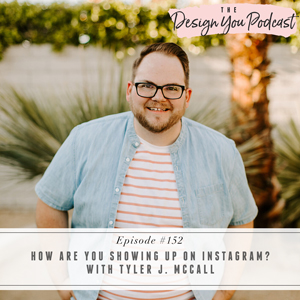
Have you ever wondered how to grow and scale your business using social media? If so, I have just the episode for you this week, friends! This week’s guest joins me to explain why showing up as your true, authentic self is the only way to use social media in your business, and how to use it to cut through the noise and stand out from the crowd.
Tyler J. McCall is the go-to Instagram marketing strategist for online business owners and digital entrepreneurs. He helps creative people start and grow profitable online businesses and use social media to tell stories, build relationships and convert followers to fans. He joins me this week to share why you have a superpower nobody else has, and how to show up honestly on social media.
In this episode, we’re covering all things Instagram and social media and showing you why your worth is not defined by the number of followers you have. We discuss why entrepreneurship is inherently political and the importance of getting real and honest with yourself in your business. Get ready to start showing up authentically right now, y’all, this is a good one.
If you want help creating a business with thriving revenue streams so that you can design the life you really want this year, now is your chance! We’re going to be opening the doors to the Design You Coaching Program really soon, get on our waitlist now!





